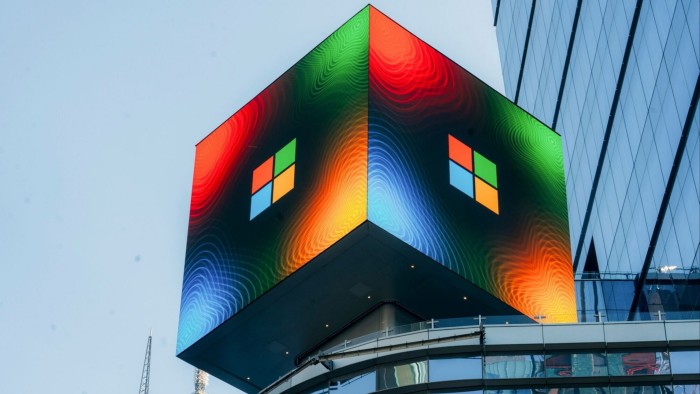Good morning. On today’s agenda:
-
The real’s rout
-
Nissan and Honda begin merger talks
-
Mangione charged with first-degree murder
-
And the new frontier in mental health treatment
We have an exclusive story on the global artificial intelligence race to start the day. Analysts estimate that Microsoft bought 485,000 of Nvidia’s flagship “Hopper” chips this year, more than twice as many as any of its largest rivals in the US and China.
With demand outstripping supply of Nvidia’s most advanced graphics processing units for much of the past two years, Microsoft’s chip hoard has given it an edge in the race to build the next generation of AI systems.
Microsoft, which has invested $13bn in OpenAI, has been the most aggressive of the US Big Tech companies in building out data centre infrastructure, both to run its own AI services such as its Copilot assistant and to rent out to customers through the Azure cloud computing business.
The Azure infrastructure was also used to train OpenAI’s latest o1 model, as they race against a resurgent Google, start-ups such as Anthropic and Elon Musk’s xAI, and rivals in China for dominance of the next generation of computing.
But while Nvidia dominates the AI chip market, rival AMD has been making inroads and Big Tech companies Google, Meta and Amazon have increased the development of their own AI chip programmes this year.
Microsoft, however, is way behind rivals in its effort to build an AI accelerator to rival that of Nvidia. Read the full story.
We have more on the race to stay ahead in the AI race and its impact on business:
-
Databricks: The US data analytics and AI company has raised $10bn in the biggest venture capital deal of the year, including from Thrive Capital and Andreessen Horowitz.
-
AI energy use: North America’s electricity grid faces “critical reliability challenges” due to surging demand from the technology, the industry watchdog has warned.
And here’s what else we’re keeping tabs on today:
-
US interest rates: The Federal Reserve is expected to lower borrowing costs by a quarter-point when it announces its decision later today alongside the final set of economic forecasts before Donald Trump’s inauguration as US president.
-
Companies: Birkenstock is expected to report a rise in fourth-quarter revenue while Cheerios maker General Mills is expected to post a decline in second-quarter revenue.
-
Economic data: New monthly residential construction data is published in the US while Argentina releases third-quarter unemployment figures and November trade data.
Five more top stories
1. Brazil’s currency rout will continue escalating unless Luiz Inácio Lula da Silva’s government delivers fiscal reforms, investors and analysts have told the Financial Times. Despite a barrage of foreign exchange interventions by the country’s central bank, the Brazilian real has fallen about 1 per cent this week alone, touching a record low of 6.21 against the dollar yesterday.
2. Nissan and Honda are in exploratory talks about a merger of the two carmakers that would create a $52bn Japanese behemoth, said people briefed on the matter. The talks are at an early stage, and there are concerns about a possible political backlash in Japan because a merger of two of the country’s most storied car brands could result in significant job cuts. More details here.
3. Russia’s FSB security agency has arrested a man suspected of assassinating a top general in Moscow yesterday. The agency said it had arrested an Uzbek resident who had placed the bomb that killed Igor Kirillov on a scooter and then detonated it remotely. This is what we know so far about the arrest.
4. Luigi Mangione has been charged with first-degree murder for the alleged killing of UnitedHealthcare’s chief executive Brian Thompson, which has a maximum penalty of life imprisonment without the possibility of parole. Mangione is being held without bail in Pennsylvania and is due in court there tomorrow morning. Here’s more on the charges.
-
Cash App stabbing: Tech executive Nima Momeni has been convicted of murdering the app’s founder Bob Lee, concluding a criminal tale that fuelled narratives about spiralling crime in San Francisco.
5. UniCredit has gained control of about 28 per cent of the voting rights in Commerzbank in the latest escalation of its controversial takeover attempt of Germany’s second-largest listed lender. The Italian bank said in a statement that the move was in line with its ambition to increase its holding to 29.9 per cent.
Today’s big read
Once a rebel stronghold, the Syrian neighbourhood of Tadamon was turned into an industrial killing field by militias loyal to Bashar al-Assad during the country’s 13-year civil war. Since the toppling of the Assad regime, residents have been returning to the Damascus suburb to find mass graves and expropriated homes. What happens next will be a test case for Syria’s new rulers.
We’re also reading . . .
-
Bending the knee: Whether they voted for him or not, executives from Hollywood, Wall Street and Silicon Valley have been rushing to pay tribute to Donald Trump.
-
Lars Windhorst: Once seen as the wunderkind of German business, Windhorst gives his account of how his ventures came crashing down in this FT film.
-
Mental health: Digital tools, such as the video game Tetris, are part of a new frontier in mental health treatments that offer promising early results.
-
David Bonderman: Read our obituary of TPG’s co-founder, a buyout pioneer who made some of the industry’s boldest bets.
Chart of the day
Brexit has hit UK trade less than many forecasters predicted, thanks to larger companies adapting to red tape at the border, according to research by the London School of Economics. However, smaller companies have been hit hard.
Take a break from the news
Pop critic Ludovic Hunter-Tilney looks back at this year’s best album releases, including Charli XCX’s summer hit Brat, Kim Gordon’s second solo outing The Collective and Ka’s “hypnotic” The Thief Next to Jesus.
Read the full article here

